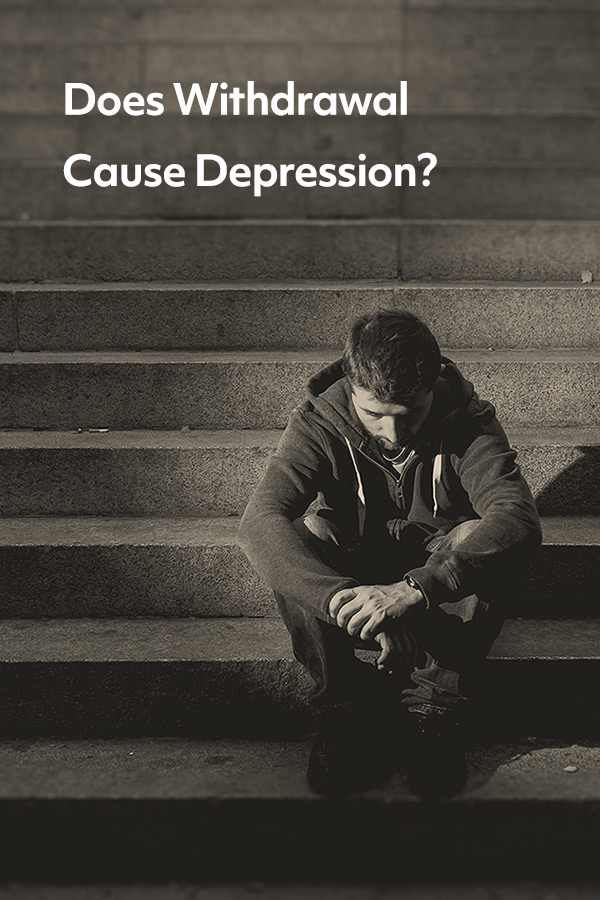Depression commonly goes hand-in-hand with substance use, but how is it connected with withdrawal?
While the decision to quit drinking or using drugs is quite possibly the best decision someone with addiction can make, that doesn’t mean it’s easy. Your life will improve radically. However, you have to first navigate the hurdle of withdrawal. The severity of that withdrawal, and whether you might struggle with depression, really depends on the type of addiction you (or your loved one) were suffering with.
The process of withdrawal
Anyone who has used substances—whether alcohol or drugs—for a prolonged period may go through the process of withdrawal. Why? Over time the body develops a tolerance to the substance, meaning you need more and more to get the same effects. Certain substances, like opioids and benzodiazepines, can cause the body to become physically dependent on them to feel functional. When this occurs, stopping the substance may cause physical symptoms of withdrawal. Withdrawal means that the body is adjusting to no longer having that substance in your system.
The process of withdrawal really depends on the type of substance, how long it has been taken, and in what doses. For example, opioid withdrawal usually begins 8-24 hours after the last dose and can last for 4-10 days. The average physical symptoms of alcohol withdrawal begin 6-36 hours after the last drink and last about 4-5 days. Benzodiazepine withdrawal can start within 1-4 days and last several weeks or months.
As a broad generalization, one can expect to experience physical withdrawal symptoms (which also vary depending on the type of substance) for a period of up to two weeks. Mental and emotional withdrawal symptoms can last longer. In some cases, detoxing from drugs or alcohol can result in post-acute withdrawal syndrome (PAWS), which I’ll discuss more below. It is worth noting that there are medications available that can help alleviate withdrawal symptoms.
Common withdrawal symptoms
Withdrawal symptoms will vary, but broadly speaking, the withdrawal process often includes:
- Depression
- Anxiety
- Restlessness
- Difficulty sleeping
- Nausea
- Diarrhea
- Sweating
- Body aches
- Yawning
- Mood swings
- Low energy and fatigue
- Irritability
- Runny nose
- Dilated pupils
As mentioned earlier, the type and severity of withdrawal symptoms depend on the type of substance used, how much was used, and how long it has been used.
Post-acute withdrawal syndrome (PAWS)
In some instances, people in withdrawal may experience symptoms for a prolonged period of time, i.e. beyond the typical two-week window. This extended process of withdrawal is called PAWS. Post-acute withdrawal often happens in bouts of a few days and can recur periodically. So a person doesn’t usually feel PAWS symptoms all the time, non-stop, but in recurring episodes. These episodes can persist for up to a year.
Symptoms of PAWS include:
- Depression
- Anxiety
- Mood swings
- Low energy/fatigue
- Chronic pain
While PAWS can happen with any substance withdrawal, it is most common with these substances: alcohol, antipsychotics and antidepressants, benzodiazepines, marijuana, stimulants like cocaine, and opioids.
Not everyone in recovery experiences PAWS, but it is helpful to be aware that it exists. If a person experiences episodes of these symptoms after stopping substance use, it can be a nudge to speak with their medical provider.
Facts about depression
Note that depression was on both the list of common withdrawal symptoms above and on the list of PAWS symptoms. Continued drug use can affect the chemical messaging in the brain associated with motivation and reward. As the brain adjusts to the absence of substances, people may experience symptoms of depression, such as sadness, feelings of hopelessness, lethargy, feeling low or a sense of doom, and lack of energy.
It is important to remember that if you feel like you can’t cope and the depression is prolonged (i.e. longer than the withdrawal period), then you should consult your medical provider. There is treatment for depression, even when it is tied to stopping substance use.
How to navigate depression in withdrawal
It’s important to go into recovery with an awareness of the potential side effects, including depression, so you can plan for them. If you’ve been taking substances for a prolonged period and worry you may experience withdrawal, it’s important that you check in with your medical provider and/or an addiction expert that can support you through the process. You can talk to them about the possibility of medication-assisted treatment that can alleviate withdrawal symptoms. For example, Workit Health clinicians regularly prescribe buprenorphine/naloxone medications like Suboxone to support recovery from opioid use disorder, and can also prescribe comfort medications to ease physical withdrawal symptoms from alcohol and opioids.
While it may seem that depression is overwhelming or too painful to navigate, please remember that there are resources to help you through the process. Once you reach the other side, you will feel relief to live a life in recovery.
Need more help?
You may find the following resources helpful to help navigate withdrawal:
- SAMHSA National Helpline (website): 1-800-662-HELP (4357) — TTY: 1-800-487-4889
- Suicide & Crisis Lifeline: 988
- SAMHSA Treatment Locator for Behavioral Health Treatment Services (website)
- SAMHSA Disaster Distress Helpline (website): 1-800-985-5990 — Call or text









